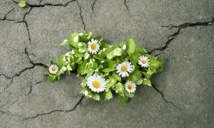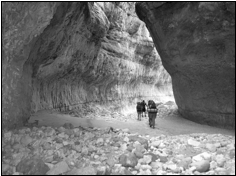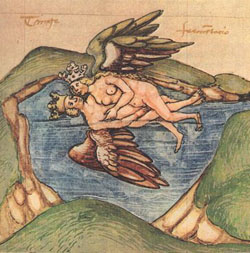Ego & Nature
Another gift from Linda Buzzell-Salzman:
Submitted by Linda Buzzell-Salzman
Tree Marriage
by William Meredith
In Chota Nagpur and Bengal
the betrothed are tied with threads to
mango trees, they marry the trees
as well as one another, and
the two trees marry each other.
Could we do that some time with oaks
or beeches? This gossamer we
hold each other with, this web
of love and habit is not enough.
In mistrust of heavier ties,
I would like tree-siblings for us,
standing together somewhere, two
trees married with us, lightly, their
fingers barely touching in sleep,
our threads invisible but holding.
from Effort at Speech. © Northwestern University Press, 1997
Some years ago Michael Aleksiuk submitted a pdf of his book ‘Billy Beaver: An Environmental Allegory‘ to Gatherings. Its premise is that the human striving for status is at the psychological roots of environmental degradation. This ‘children’s story’ has been heartily endorsed by academics and scholars worldwide as a breakthrough in understanding. It is still available in the Gatherings Archives of Jan 05 – December 05.
All those years ago Solomon Benatar was invited to write a foreword to ‘Billy Beaver’ and he tracked us down so that we can include his foreword here with the original story; download and read his work here: Billy Beaver Foreword.
“If you are divided from your body, you are also divided from the body of the world which then appears to be other than you or separate from you rather than the living continuum to which you belong”
~ From New Self New World, by Philip Shepherd
The quote comes from Parisian Pierre Goirand, who sends out an always-brilliant weekly quote to his mailing list.
Abstract: Western culture has a history of union and subsequent separation from nature. This split between spirit and nature, psyche and soma, intellect and emotion, science, philosophy, and religion, manifests in our individual and collective consciousness creating crises that span the spectrum of human experience, from the psychological to the environmental. Since we have within our unconscious, memories of our being in union with nature, it is a matter of recovering them through what Carl Jung called the individuation process; whereby, a person develops one’s unique individuality from that which has been imposed on him or her from the environment. An expansion of consciousness and recovery of the eco-unconscious is achieved by the confrontation with and integration of unconscious material culminating in coniunctio, or union of the opposites….Read Article
By Linda Buzzell-Saltzman, previously published in The Huffington Post as “The Zen of Pruning” , 1/16/12.
Winter and early spring are the seasons when many gardeners, orchardists and farmers — fancying themselves surgeons — approach their trees, shrubs and roses with knives, pruning shears and saws in hand, seemingly unaware that these plants are, as the Buddhists would say, sentient beings.
Most pruning is less a conversation between two of nature’s creatures and more an act of ruthless domination under the guise of necessity. Continue Reading →
A new ecopsychoanalysis blog.
 And a new ecopsychology book, an anthology of writings from the UK: Vital Signs: Psychological Responses to Ecological Crisis by Mary-Jayne Rust & Nick Totton (Karnac, 2011).
And a new ecopsychology book, an anthology of writings from the UK: Vital Signs: Psychological Responses to Ecological Crisis by Mary-Jayne Rust & Nick Totton (Karnac, 2011).
From the Introduction:
 “Vital signs’ are, of course, the basic physiological measures of functioning which health practitioners use to assess the gravity of a patient’s predicament. This anthology focuses not so much on our physical predicament, with so many of the Earth’s systems severely stressed and beginning to fail – there are plenty of other places to read about this. Instead we focus on our psychological predicament, as news of the situation slowly penetrates our defences and we struggle as individuals and as a society to find an adequate response.”
“Vital signs’ are, of course, the basic physiological measures of functioning which health practitioners use to assess the gravity of a patient’s predicament. This anthology focuses not so much on our physical predicament, with so many of the Earth’s systems severely stressed and beginning to fail – there are plenty of other places to read about this. Instead we focus on our psychological predicament, as news of the situation slowly penetrates our defences and we struggle as individuals and as a society to find an adequate response.”
 Santa Barbara psychotherapist/ecotherapist Linda Buzzell and John F. Kennedy University ecopsychology professor Dr. Craig Chalquist, co-editors of Sierra Club Books’ “Ecotherapy: Healing with Nature in Mind” — both graduates of the Permaculture Design Course — explore the possibilities though this very preliminary dialogue that will hopefully open a much wider conversation about whether — or even if — the ecologically-based principles of permaculture can address the remediation of devastated psychological and social ecosystems as well as abused and neglected places.
Santa Barbara psychotherapist/ecotherapist Linda Buzzell and John F. Kennedy University ecopsychology professor Dr. Craig Chalquist, co-editors of Sierra Club Books’ “Ecotherapy: Healing with Nature in Mind” — both graduates of the Permaculture Design Course — explore the possibilities though this very preliminary dialogue that will hopefully open a much wider conversation about whether — or even if — the ecologically-based principles of permaculture can address the remediation of devastated psychological and social ecosystems as well as abused and neglected places.
Comments are welcome and can be sent to lbuzzell@aol.com
A short film by Mark Brennan from Nova Scotia about the Acadian Forest from a Deep Ecology Perspective.
 EarthCare Global TV has an amazing archive of “Internet TV” titles, ranging from Agriculture to Transportation.
EarthCare Global TV has an amazing archive of “Internet TV” titles, ranging from Agriculture to Transportation.
“Mt Hood from Mt Tabor” by David Johnson
Abstract: In this article author Tatiana Casey explores her own symbiotic relationship with the earth, life, and Self through an ecopsychological lens. The definition of Ecopsychology is also explored and defined through varying perspectives which include information from research, personal interviews, and eco-therapeutic topics.
Download the full article (pdf)
 John Lynch has been bringing outdoor leadership students to Kanab Creek Wilderness for over ten years. Each visit, however, offers the clear truth that the land is the real teacher. Kanab Creek, and presumably all wild places, have a knack for providing insight around the greater lessons of life. In this case, they are uniquely delivered to each individual through the voice of the earth as translated by the desert. The attached articles is a short reflection describing a day of communion and muse between a man and Kanab Creek: Lessons-from-Kandab
John Lynch has been bringing outdoor leadership students to Kanab Creek Wilderness for over ten years. Each visit, however, offers the clear truth that the land is the real teacher. Kanab Creek, and presumably all wild places, have a knack for providing insight around the greater lessons of life. In this case, they are uniquely delivered to each individual through the voice of the earth as translated by the desert. The attached articles is a short reflection describing a day of communion and muse between a man and Kanab Creek: Lessons-from-Kandab
Cool video from the Let’s Go Outside Revolution, sent in by our keen web-watcher Chitola Utsanami.
A link to this video showcasing the beauty of the Omo people was sent to us by Chitola Utsanami (aka Jorge Conesa-Sevilla)
By Robin E. Gates
 Abstract: Western culture has a history of union and subsequent separation from nature. This split between spirit and nature, psyche and soma, intellect and emotion, science, philosophy, and religion, manifests in our individual and collective consciousness creating crises that span the spectrum of human experience, from the psychological to the environmental. Since we have within our unconscious memories of our being in union with nature, it is a matter of recovering them through what Carl Jung called the individuation process; whereby, a person develops one’s unique individuality from that which has been imposed on him or her from the environment. An expansion of consciousness and recovery of the eco-unconscious is achieved by the confrontation with and integration of unconscious material culminating in coniunctio, or union of the opposites. Download the full article (pdf).
Abstract: Western culture has a history of union and subsequent separation from nature. This split between spirit and nature, psyche and soma, intellect and emotion, science, philosophy, and religion, manifests in our individual and collective consciousness creating crises that span the spectrum of human experience, from the psychological to the environmental. Since we have within our unconscious memories of our being in union with nature, it is a matter of recovering them through what Carl Jung called the individuation process; whereby, a person develops one’s unique individuality from that which has been imposed on him or her from the environment. An expansion of consciousness and recovery of the eco-unconscious is achieved by the confrontation with and integration of unconscious material culminating in coniunctio, or union of the opposites. Download the full article (pdf).